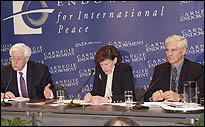Registration
You will receive an email confirming your registration.
IMGXYZ275IMGZYXThe Carnegie Endowment for International Peace has just released Iraq: What Next?, a report that answers key questions related to the current crisis, particularly focusing on weapons inspections. Building on the report, the Carnegie Endowment hosted a briefing to address latest developments on the Iraq crisis, from President Bush's State of the Union address to European expectations for Secretary Powell's United Nations mission on February 5th to next steps in the inspections process, including overhead surveillance.
Who:
Ambassador Rolf Ekeus, former executive chairman of UNSCOM
Jessica T. Mathews, president, Carnegie Endowment; coauthor of Iraq: What Next?
Joseph Cirincione, senior associate, director of the Non-Proliferation Project, Carnegie Endowment, and coauthor of Iraq: What Next? (moderator)
Full Audio Transcript
Joseph Cirincione
Jessica Mathews
Rolf Ekeus
Question and Answer Session
Mathews opened the discussion by summarizing the key questions outlined in Carnegie's new report. Ambassador Ekeus provided a detailed assessment of the current inspection regime. He addressed its strengths and weaknesses and compared its development to that of UNSCOM. Ekeus described the current regime as coercive and indicated that the Iraqis have yet to pose any serious obstructions to the process. Inspections between 1991 and 1998 were fundamentally successful, according to Ekeus, and the conditions have only improved since then.
Ekeus emphatically underlined the need for the use of U2 surveillance flights to provide operational support, high-resolution photographs, and sweeping photographs that would pick up electric grids, water and road networks and other evidence of large-scale weapons production. He also stressed the importance of good intelligence.
Both Ekeus and Mathews suggested that, under the present circumstances, Iraq is probably not capable significantly improving its WMD capability. Ekeus noted that Iraq made no significant progress on prohibited programs during UNSCOM's watch. Furthermore, both speakers emphasized the capacity for inspectors to handle and break Iraq's production capability between 1991 and 1998. According to Ekeus, inspections can work even if Iraq is not proactively involved. Even if Iraq cooperated fully, as is called for by Resolution 1441, the United States would remain highly doubtful of Saddam's disclosure. Ekeus stressed that the inspections have only begun and he would not be comfortable deeming them complete before two years.
On the link between Iraq and terrorism, both panelists had quite a bit to say. Ambassador Ekeus addressed the alleged link between Al Qaeda and Iraq with doubt. According to Ekeus, an alliance between Al Qaeda and Iraq does not fit into the Ba'ath party style. While both parties want the United States out of the Middle East, a strategic alliance between the two is extremely unlikely. Mathews stressed that every counter-terrorism expert has indicated that a war with Iraq would only further jeopardize our homeland security.
In the discussion that followed each presentation, Ekeus and Mathews addressed a number of other outstanding concerns.
- When asked about the presence of a permanent inspection regime as an alternative to war, Mathews pointed out that UNMOVIC's mandate involves monitoring and verification, making the timeline for the disarmament process open-ended.
- In response to a question on the composition of the inspection teams, she underscored the importance of having experienced inspectors, according to Resolution 1441, even if this meant that the teams were not completely geographically balanced. Mathews emphasized the need to for former UNSCOM inspectors on the new UNMOVIC teams.
When asked to evaluate the IAEA's claim that the Iraqi nuclear program remains neutralized, Ekeus deemed that position to be a strong one, given the difficulty Iraq would face in internally producing fissile material without detection. He did note that the international community should remain concerned about the possibility that Iraq could import that material. Mathews stressed that a nuclear weapons arsenal would be, by far, the most destructive and the easiest to detect.
- In response to a question on mobile biological laboratories, Ekeus said that UNSCOM teams never came across mobile labs, although they did pick up the presence of trucks capable of transporting frozen materials. He considered a mobile lab to be a very dangerous and difficult operation that required highly complex material. He added that, in UNSCOM's experience, intelligence that came from defectors was often of poor quality.
- When asked how she expected the following weeks to unfold, Mathews replied that the momentum for war is growing. According to Mathews, the United States is capable of bringing countries along, even those in which serious internal opposition to war persists. But unpredictable factors remain that could throw this momentum of course, including the situation in North Korea. She concluded that it is important to note that we would not be at a point where inspections, if given a real chance, can succeed, if the Administration had not made it clear that it would be willing to go to war. The peaceful disarmament of Iraq would be an extraordinary victory for the Bush presidency.
